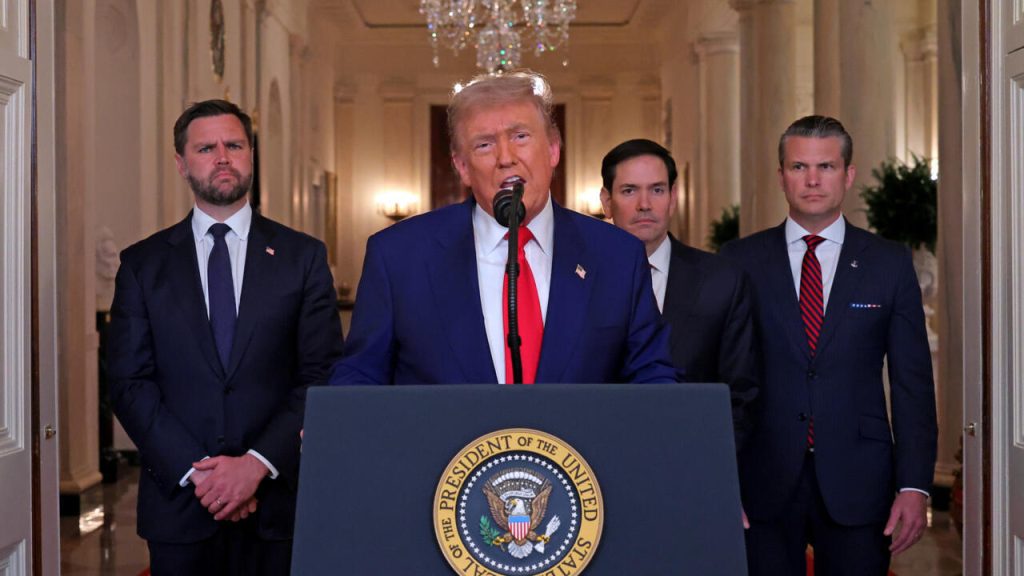US President Donald Trump, during a press talk at the NATO summit in the Netherlands, celebrated what he called a highly successful meeting. He praised allied nations for raising defense spending and spoke proudly of America’s recent military actions in the Middle East.
Calling the NATO event “very wonderful,” Trump told the press that collective defense budgets had grown by $700 billion. “They must keep investing more in their armed forces,” he urged. His message was clear—military strength remains a top priority.
In his Trump ceasefire statement, the president declared the Iran-Israel conflict over. He labeled the 12-day war “finished,” describing both countries as “tired and exhausted.” According to Trump, a return to fighting wasn’t impossible but was unlikely for now. “They fought hard, and the war is done,” he said. “Can it start again? Sure, maybe. But not today.”
Trump also took credit for the ceasefire, calling it a “huge success.” His truce comments stressed the role his administration played in ending the bloodshed. “I handled both sides. They’re worn out,” he added.
On Iran’s nuclear program, Trump was firm. He spoke in detail about US airstrikes on the Fordow nuclear facility. “The site was obliterated,” he said. He dismissed early intelligence reports that suggested the strikes only delayed Iran’s nuclear progress. “That’s false reporting,” Trump insisted, accusing The New York Times of spreading fake news.
He emphasized that he had spoken directly with the pilots. “They said the mission was perfect,” Trump told the press. “You should be proud of them, not questioning them.”
In his Trump ceasefire statement, the president issued a sharp warning to Iran. He said Tehran had been given a chance to pull back and that they shouldn’t restart their nuclear activities. “They’ve been given a big advantage in backing off,” Trump said. “I don’t think they’ll go back to the nuclear issue.”
Talks between Washington and Tehran could resume soon. “We’ll be talking next week. Maybe we’ll sign an agreement, who knows?” Trump said. However, he expressed low interest in negotiations, claiming the nuclear program had already been dismantled.
Trump then turned to Iran’s missile strike on the Al Udeid Air Base in Qatar. He said the attack was more symbolic than destructive. “They gave us a warning, very nice of them,” Trump said. “They said one o’clock. We evacuated the base before it happened.” He claimed all 14 missiles were shot down. “That’s like hitting a bullet with a bullet,” he added.
In a rare moment of levity, Trump joked with military personnel. “Do you hit targets this well often?” he asked. “Pretty much, sir,” was their reply.
During his ceasefire remarks, Trump praised Pakistan’s Chief of Army Staff, Field Marshal Asim Munir. He described him as “a great person and an inspiring figure.” Trump confirmed that Munir had visited the White House and they discussed security matters in the region.
Trump also highlighted his role in calming tensions between India and Pakistan. He said he warned both leaders that trade talks would stall if fighting continued. “I told them, no trade if you keep fighting—and they stopped,” he said. Trump also reaffirmed his friendship with Indian Prime Minister Narendra Modi.
While optimistic about peace in the Middle East and South Asia, Trump admitted that the war in Ukraine is much harder to resolve. “It’s very difficult to stop the war between Russia and Ukraine,” he said.
On a positive note, Trump revealed that Saudi Arabia and the UAE have committed to investing billions in the region following the ceasefire. “They’re ready to invest again,” he announced.
This Trump ceasefire statement may become a key moment in defining US diplomacy. It showcases the president’s mix of strong military posture, bold claims, and blunt diplomacy. His truce comments spanned three continents, from Europe to Asia to the Middle East.

